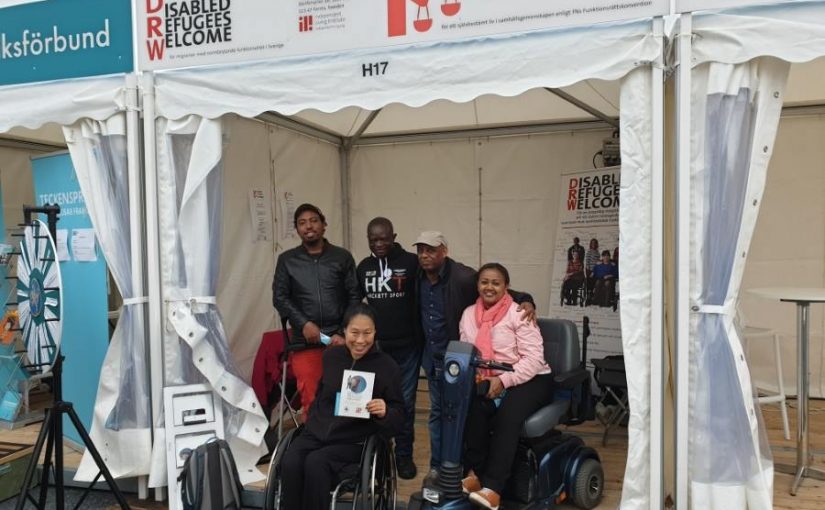First of all, I would like to say it is my pleasure to present Disabled Refugees Welcome for the distinguished guests to the DRW tent. I would like to extend my special thanks to Disabled Refugees Welcome (DRW) project’s leader Jamie Bolling for giving me the opportunity to attend Järvaveckan; thank you! My friends, colleagues and all project team – thank you too. People that might not have been here – my sibling’s brothers and sister, I can’t thank you enough for everything and God continues to bless our family. Last but not least my appreciation and thanks go also to all Skellefteå, Boliden, Svenska kyrkan community for all the well rounded support in Sweden. It was great to meet the guests who visited DRW. As you can see I am going to present my speech in English. I am improving my Swedish and ask – ska jag presentera mig på svenska? Nej ingen fara jag fortsätter (vidare) med engelska nu.
Ladies and gentlemen DRW is founded to support immigrants with disability. At the core of DRW project the main objective is to trace the problems faced by disabled immigrants and to ascertain the right of this disadvantaged group and to bring the issues to the relevant corresponding organization.
To begin with, there are common problems that can happen to immigrants. But these problems will be double in size and degree of challenge when faced by people with disabilities. In the first place; people with disabilities when they are assigned living accommodation (camps) it is a huge problem. In this regard; DRW is actively involved in creating awareness about disability. Besides; I see a loophole that DRW is emphatically working with, to bridge gaps in the procedure and inconveniences by raising the issues to relevant organisations which ultimately led to improve the living standard of immigrant with disabilities and the right to be protected. Particularly immigrants with disabilities who have difficulty with mobility facing transport problems. Camps are far from the supermarket, there is a lack of accessible transport and lack in choice of suitable transport. Living isolated is generally speaking not in the best interest of the person with disability.
Once a person gets a permanent resident permit I strongly believe that the disabled person should be assigned a place to live in his/her preferred municipality (kommun). But I want to put emphasis with respect to education planning and the establishment process. The program is for a two-year period. Everybody including disabled immigrants are expected to finish within this time frame. I believe this should be altered (changed). For example, I participated 4 hours per day in education planning but other non disabled people participated 8 hours per day. Obviously, this brings a discrepancy in score yet they give us the same time span of two years. I think it is time to bring more justifiable planning that takes into account the special circumstances of disabled immigrants. Similarly, it is encouraging (commendable) if the case officers (handläggare) have awareness about disabilities. For example, my former case officer often says there are no activities or it is very difficult to find jobs that are suited for me, which makes me unhappy.
I asked to change my case officer but haven’t gotten a new one yet and it has been 3 months now.
The DRW project plays a very irreplaceable role in identifying problems and brings tangible benefits to disabled migrants so that disabled migrants can have a happier and productive life. Trying to help them to unleash their potential. DRW is an iconic project primarily serving disabled migrants. The project has a three-year life period and it has a huge impact. DRW is playing a vital role in bringing migrant’s disability rights to the front table discussion, streaming to civil societies and other relevant stakeholders. Likewise; awareness creation, traceability and safeguarding our rights is always championed in DRW day to day activity. Thus, supporting this advocacy project in resource or any form has a paramount importance in order to extend the time and scale up its horizon (impact). In conclusion; Ladies and gentlemen, please allow me to say one important thing. Despite the gaps and rooms which needs to be filled as I highlighted; I truly believe that there are a lot of noticeable and remarkable things both for immigrants and also disabled migrants. For instance, I received a prosthesis, this after 20 years of need. It is great as is helping my mobility and enjoyment of life.
Thanks to all of you. If you have questions or if you need further explanation or any comments you are very welcome to contact me through DRW.
Sisay Game Beneye
